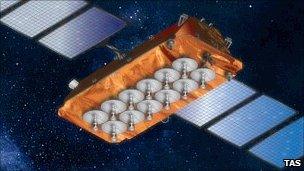O3b 'fibre in the sky' project wins financial backing
- Published

The funding allows O3b Networks to launch its first eight Medium Earth Orbit satellites
The financing has been secured for one of the most ambitious commercial space projects of the decade.
O3b Networks has raised $1.2bn (£700m) for a series of satellites to support super-fast broadband connections to Africa and other emerging markets.
The spacecraft will act as backhaul, linking the traffic of local telecoms and internet service providers to the global fibre infrastructure.
O3b, external has its headquarters in Jersey, Channel Islands.
The company informed the markets early on Monday that a collection of investors and banks would provide the money it needed to launch the venture's first eight satellites.
These will be constructed by Thales Alenia Space, external at its manufacturing facility in Cannes, with the first platforms ready to go into orbit in the first half of 2013.
Russian Soyuz rockets will launch the satellites from the new Sinnamary spaceport in French Guiana.
'Development project'
O3b's largest debt facility, some $510m, is being provided by HSBC, ING, CA-CIB and Dexia. This is underwritten by the French export credit agency, Coface, which has been extremely active recently in supporting big space projects involving Thales Alenia.
"Two other tranches of our debt are provided by developmental financial institutions, like the African Development Bank and the International Finance Corporation whose primary goal is to get economic development going in regions of the world where development is still lacking," said O3b CEO Mark Rigolle.
"So having them onboard as well underscores the second great thing about this company - we're going to develop an infrastructure which will allow businesses to be created [and] education to penetrate where otherwise they would not have," he told BBC News.
This social perspective is reflected in O3b's name, which stands for "other three billion".
It is a moniker for the number of people in the world said to have inadequate broadband internet access.
One of the reasons for this inadequacy is the absence in many regions of a backbone of super-fast fibre-optic-cable connections. O3b's vision is to provide a "fibre in the sky" alternative with a constellation of high-throughput satellites.
This constellation will be put in a Medium Earth Orbit (MEO) about 8,000km above the equator, providing coverage around the globe to a latitude of plus and minus 45 Degrees.
'Low latency'
Each 700kg satellite will operate in the high-frequency Ka-band of the radio spectrum.
They will sport 12 steerable antennas to link customers to O3b's eight ground stations from where traffic can be fed into the fibre network that underpins the internet in the developed world.
Flying in MEO means the satellites will be four times closer to the Earth than is the case with traditional geostationary (GEO) telecommunications spacecraft which sit 36,000km above the planet. This should reduce substantially the delay, or latency, of the signal as internet traffic is routed via space.
"Large parts of the world rely on geostationary satellites which have certain disadvantages for internet backhaul, in particular the lack of speed and the cost per bit transmitted," Mr Rigolle said.
"We come in nicely in the middle: we're faster than geostationary satellites and almost as fast as fibre, and we're cheaper than satellites and almost as cheap as fibre."
O3b is promising round-trip data transmission of about 100 milliseconds compared with the more than 500 milliseconds associated with GEO. The satellites should have the capability to deliver 10 beams, with 1.2Gbps per beam, to each of its seven operational regions.
The project needs a minimum of six satellites in orbit, but the intention is to put up perhaps as many as 20 eventually.
- Published26 November 2010
- Published26 November 2010